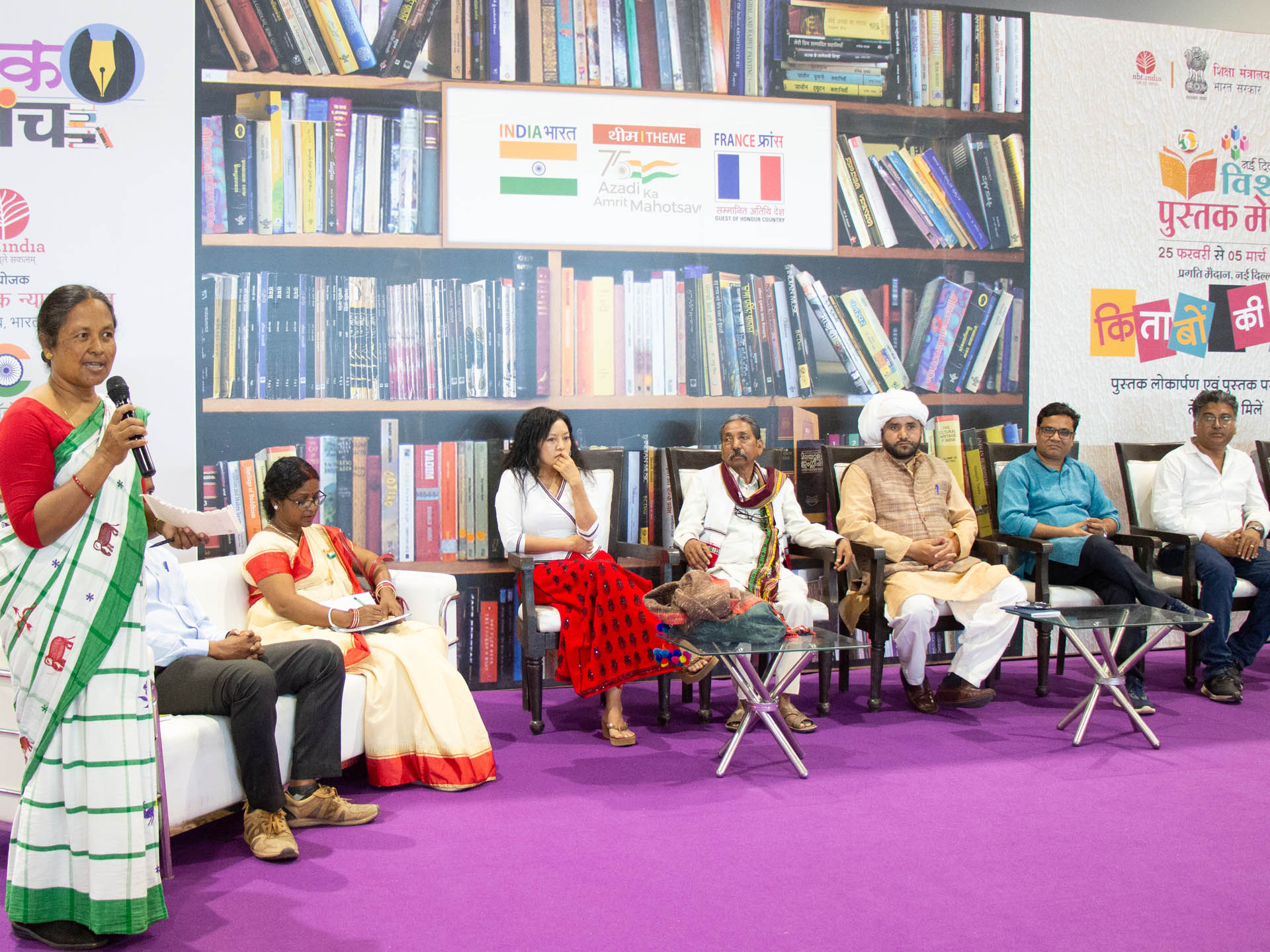Jaipal Julius Hanna Award Ceremony Report 2023

Adivasi literature is the creative expression of collective memories – Lanusangla
Adivasi literature is not merely an account of a resistant life enduring violence, but an expression of collective memories and creativity inspired by the life philosophy of the ancestors. Adivasi people do not equate life only with sorrow and struggle. They are advocates of a peaceful, co-existent world, and present this in their literature with creative imaginative skill. These were the words of Ao-Naga writer and publisher Lanusangla Tzudir from Nagaland. She was speaking as the chief guest at the second Jaipal-Julius-Hanna Literary Award Ceremony held at Ranchi Press Club on 26 November 2023. On this occasion, Adivasi poet and artist Sukumaran Chaligatha from Kerala delivered the keynote address. A multilingual song gathering was also held in which 24 Jharkhandi poets and lyricists sang songs in their mother tongues. The event was organised by the Pyara Kerketta Foundation in collaboration with Jharkhandi Bhasha Sahitya Sanskriti Akhra and Tata Steel Foundation.
The ceremony began with ancestral remembrance and Nagara drumming. Guests and awarded writers were welcomed by Gloria Soreng, President of Pyara Kerketta Foundation, and Jiren Xavier Topno from Tata Steel Foundation. Introducing the event, Vandna Tete, Secretary of the Foundation, said that First Nations (Indigenous/Adivasi) orality, writing, and literature have today become as universal as the greeting ‘Johar’. The purpose of the Jaipal-Julius-Hanna Literary Award is also the same – to encourage the literature and writers of the new generation and to unite Adivasi writers at an all-India level.

Ao-Naga writer and CEO of Heritage Publication House, Dr. Lanusangla Tzudir, while inaugurating the ceremony, said that it is literature and culture that can unite us Adivasis. Remembering Padma Shri Naga writer Dr. Temsula Ao, she said that there is great strength in Adivasi storytelling, and the new generation can learn much from it. This award will become a major initiative in this direction in the times to come.
Rawla poet from Wayanad and member of Kerala Sahitya Akademi, Sukumaran Chaligatha, in his keynote address, said that his real name is Bethimaran, but in school it was changed to Sukumaran. This is happening to Adivasis all over India – our identities are being changed. In Kerala, there is not just Malayalam. In 2018, we tried to break this misconception by publishing a poetry anthology of 41 Adivasi poets. The way the Jaipal-Julius-Hanna Award is bringing forward emerging Adivasi writers, similar efforts are needed across India.
At the ceremony, Santosh Pawara from Maharashtra was honoured for Hemtu (Pawara-Hindi poetry collection), Pooja Prabha Ekka from West Bengal for Somra ka Disum (translated short story collection), and Tunung Tabing from Arunachal Pradesh for Gompi Gomuk (Adi-Minyong-Hindi poetry collection) for the year 2023. The award included a shawl, a memento, a certificate, cash royalty, and 50 copies of their published books. In this session, the Malayalam address by Sukumaran was translated into Hindi by noted activist Ajita George, and Lanusangla’s English speech was translated by young filmmaker Deepak Bada. The award session was conducted by Kharia scholar Preeti Ranjana Dungdung.
In the second session of the award ceremony, a programme of multilingual song performances was held. Under this, Swarnlata Aind, Sangi Samad, Agustus Mundu (Munda); Tarkeleng Kullu, Jewel Kerketta (Kharia); Sita Oraon, Sukhdev Oraon (Kudukh); Pano Hansda, Santosh Murmu, Ganesh Murmu, Shivnarayan Hembrom (Santali); Haldhar Ahir, Aparajita Mehta (Panchpargania); Carmela Ekka (Sadri); Asinta Asur, Bhikha Asur, Reshmi Asur (Asur); Anima Telra, Saroj Telra, Thedor Birjia, John Birjia (Birjia); Pradeep Kumar Deepak (Khortha); Sadhna Samad Chaki, Dr. Ramdas Barda, and Jagannath Hansda (Ho) – a total of 25 Jharkhandi lyricists presented songs in their mother tongues. This session was chaired by eminent Mundari poet Remis Kandulna and Sahitya Akademi award-winning Santali poetess Joba Murmu. The session was conducted by Ho writer Shanti Sawaiyan, and the vote of thanks was given by Shyam Murmu from Ghatshila.
Report by: Krishnamohan Singh Munda